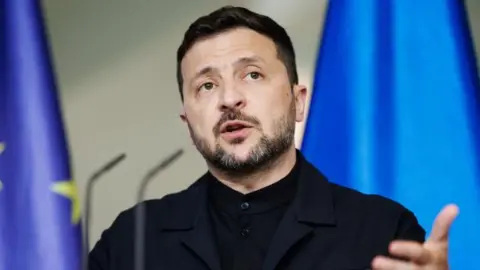Ukraine accuses Russia of undermining next round of peace talks
 Getty Images
Getty ImagesUkraine's president has questioned Russia's commitment to progressing peace talks after Moscow confirmed it was sending a team to talks in Istanbul on Monday.
Russia is yet to send its negotiating proposals to Ukraine - a key demand by Kyiv. Kremlin spokesman Dmitry Peskov said Moscow's conditions for a ceasefire would be discussed in Turkey.
But Volodymyr Zelensky accused Moscow of "doing everything it can to ensure the next possible meeting is fruitless".
"For a meeting to be meaningful, its agenda must be clear, and the negotiations must be properly prepared," he said. Ukraine had sent its proposals to Russia, reaffirming "readiness for a full and unconditional ceasefire".
The first round of talks two weeks ago in Istanbul brought no breakthrough, but achieved a prisoner of war swap.
Russian President Vladimir Putin launched a full-scale invasion of Ukraine in February 2022.
Russia currently controls about 20% of Ukraine's territory, including the southern Crimea peninsula Moscow annexed in 2014.
As the talks approached, both Russia and Ukraine reported explosions on Friday night and in the early hours of Saturday morning.
In Ukraine's Kherson region, three people were killed and 10 more were injured, according to Oleksandr Prokudin, head of the region's military administration.
On social media, he said that the "Russian military hit critical and social infrastructure" as well as "residential areas of settlements in the region".
One person was also killed in the Sumy region, the administration there said.
Residents of 11 settlements in the region were ordered to evacuate, bringing the total number of evacuated settlements to 213.
Officials said at least one person had also been injured in explosions in the cities of Kharkiv and Izyum.
Meanwhile, at least 14 people were injured in an explosion in Russia's Kursk region, according to the acting local governor Alexander Khinshtein and Russia's state-owned news agency, TASS.
On Friday, Ukrainian Foreign Minister Andrii Sybiha reiterated that Kyiv had already sent its own "vision of future steps" to Russia, adding Moscow "must accept an unconditional ceasefire" to pave the way for broader negotiations.
"We are interested in seeing these meetings continue because we want the war to end this year," Sybiha said during a joint press conference with his Turkish counterpart Hakan Fidan.
Putin and Zelensky are not expected to attend the talks on Monday.
But Fidan said Turkey was hoping to eventually host a high-level summit.
"We sincerely think it is time to bring President Trump, President Putin and President Zelensky to the table," he said.
Peskov said Russia's ceasefire proposals would not be made public, and Moscow would only entertain the idea of a high-level summit if meaningful progress was achieved in preliminary discussions between the two countries.
He welcomed comments made by Trump's envoy to Ukraine, retired Gen Keith Kellogg, who described Russian concerns over Nato enlargement as "fair".
Gen Kellogg said Ukraine joining the military alliance, long hoped for by Kyiv, was not on the table.
He added President Trump was "frustrated" by what he described as Russia's intransigence, but emphasised the need to keep negotiations alive.
On 19 May, Trump and Putin had a two-hour phone call to discuss a US-proposed ceasefire deal to halt the fighting.
The US president said he believed the call had gone "very well", adding that Russia and Ukraine would "immediately start" negotiations towards a ceasefire and "an end to the war".
Ukraine has publicly agreed to a 30-day ceasefire but Putin has only said Russia will work with Ukraine to craft a "memorandum" on a "possible future peace" - a move described by Kyiv and its European allies as delaying tactics so Russian troops could seize more Ukrainian territory.
In a rare rebuke to Putin just days later, Trump called the Kremlin leader "absolutely crazy" and threatened US sanctions. His comments followed Moscow's largest drone and missile attacks on Ukraine.
On Wednesday, Germany's new chancellor, Friedrich Merz, told Zelensky that Berlin would help Kyiv produce long-range missiles to defend itself from future Russian attacks.
The Kremlin said any decision to end range restrictions on the missiles Ukraine could use would represent a dangerous change in policy that would harm efforts to bring an end to the war.
